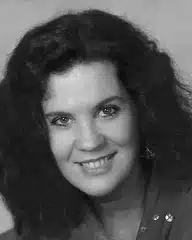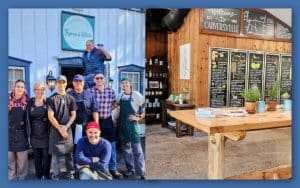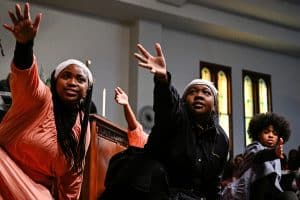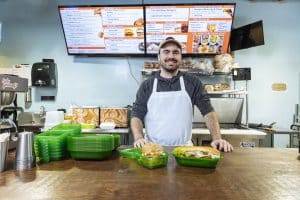“I started school and my daughter’s father passed away as soon as I started.” Since high school, Brittney Kanuck dreamt of being a nurse – of having a stable home, all her bills paid, and a little money left over for family vacations. The standard American dream.
But for low wage earners like Kanuck, following dreams takes outside resources – time, money and lots of encouragement when circumstances get rough. Luckily for her, a friend explained that Bucks County invests in people who are willing to dedicate themselves to long-term strategies for economic success.
Wednesday night 18 families will win their individual battles in the Bucks County War on Poverty. Kanuck is one of them.
She and the others will officially graduate from the Bucks County Opportunity Council (BCOC) Economic Self-sufficiency Program at The Warrington – a snazzy banquet venue with crystal chandeliers and the sort of panache that conveys to all the attendees that these individuals and their children are poor no more.
In 1964, President Lyndon Johnson launched a national War on Poverty. Following the passage of his landmark Economic Opportunity Act, Johnson paved the way for his Great Society programs. In 1965, more than a thousand agencies popped up across the nation. Federally funded, they were created to tackle poverty at the ground level. One of them was the BCOC.
Alongside his landmark bi-partisan legislation, President Johnson launched a host of programs to help folks who had little or nothing. He armed the War on Poverty offices across the country with programs like Head Start, Job Corps, and VISTA – Volunteers in Service to America – once a stand-alone entity but now part of AmeriCorps.
Over the years, the social safety net grew to include housing subsidies, supplemental nutrition programs and Medicaid. Because of these and other supports, the BCOC has many more anti-poverty arrows in their quiver now – including food distribution (including fresh produce), income tax assistance, weatherization, and homeless prevention.
Arguably, the most remarkable anti-poverty program available in Bucks County is the holistic BCOC Economic Self-sufficiency Program. This five-year course provides coaches and common necessities to people whose incomes hover at or below the federal poverty level. To graduate, a student must move themselves and their families away from privation – completely.
BCOC Executive Director Erin Lukoss is understandably pleased with the work they do. “We work to stabilize the household, stabilize the family. We move people forward through education and employment.”
Lukoss says that providing a safety net makes all the difference to folks who try to improve their lives. “If you’re worried where your next meal is coming from or where you’re going to lay your head at night, you’re not able to maybe even evaluate or look at opportunities.” Lukoss says following dreams of a better life is, “just beyond your reach and beyond the scope if you’re worried about surviving day-to-day.”
The metrics for self-sufficiency success are multi-tiered. Graduates must have employment that pays a family-sustaining wage, access to safe and reliable transportation, affordable housing, a health plan for the entire family and a balanced household budget. Since the program’s first graduating class in 1997, 420 of Bucks County families made up of 1,131 parents and children, have left destitution and consequently saved the federal, state and local taxpayer a bundle.
The stats for the 2025 graduating class are impressive. With an investment of $345,239 (this pays for necessities and the salaries of the coaches), 18 households have increased their income an average of $46,161, per family.
The families – on average – entered the program at 112% of the federal poverty rate and are now earning nearly three and half times that much. Nine of these households no longer receive a combined $65,000 in food assistance. The cumulative annual gain for these 18 families is just shy of $1 million – all of which has stayed in Bucks County’s local economy.
READ: Food Insecurity in Bucks County Worsened by Trump and DOGE Cuts
Tonight’s class, including Brittney Kanuck who is now a trauma nurse at Temple University Hospital, have each overcome great obstacles. When she started the self-sufficiency program, young and a single mom, Kanuck had her cosmetology license and a limited work schedule.
After her daughter’s dad died, she knew she wanted better and that she was alone as she tried to juggle everything – part-time work, part-time nursing school, and full-time mom. Brittney balanced everything until a serious car accident robbed her of her transportation. That’s when a friend at school recommended BCOC as a resource that might help.
The opportunity council was able to help Brittney with their Wheels to Work program – eventually gifting Brittney a vehicle that had been donated by someone in the community. Getting a car helped enormously – but Brittney received an even better gift – a slot in the self-sufficiency program and a coach who has been by her side the entire time.
“They helped me in multiple different ways and not just financially, mentally, too. My coach, her name is Mary. If I felt discouraged or was upset because my workload was so hard, all I had to do was call her. She was always there for me.”
That self-sufficiency coach, Mary Finch, loves her job. “It’s a wonderful, wonderful program.”
Finch has spent decades helping Brittney and scores of other clients like her. She finds most people have dreams, but folks with limited financial means don’t have a way to achieve them. “You know, they come in with some type of goal, usually to go to school.”
Finch gets to know them, then helps them formulate a plan. “We make sure they’re doing the scholarship grant applications, loans, Pell grants. It’s tough out there. I think it’s nice to have somebody in your corner.”
What do Finch’s clients NOT get? “Judgement! No judgement. I’m big about that. We all got a past.”
Finch says that people looking backward or worried about what people think, have a harder time moving forward. “You want them to come motivated and ready to work. I mean, it’s a five-year program.” And, she says, clients, “usually find that by the time they kind of get things together, then get into school and acclimated to a new job, they start moving up the ladder.”
Finch and the others at BCOC don’t just coach the clients and help with rent, utilities, transportation and food. They help with the kids too. Another 2025 graduate, Amber Canada, explained, “I gave the opportunity council a call because I was a single mother. I had no car, but I did have a job. I really wanted to pursue my dream of going to school.”
Worst of all, Canada and her child had no home. “I met with a caseworker, Rebecca, who is amazing. I ended up being able to get my own place.”
Once a person – like Canada – realizes that BCOC won’t let them falter, people have the confidence to finish school or enter training programs. And, Lukoss says, the long-term results of increasing one’s earning power improves the lives of the entire community. “I think that the work is incredibly impactful, generationally impactful because it helps people not only currently, but people who are involved in the program, it helps them for years.”
In Canada’s case, she worked and studied for her certification as both a radiology and dental technician. BCOC provides back-to-school and holiday items for families, so Canada’s kids had what they needed.
Community members generously pitch-in to provide backpacks, school supplies, and gifts so that parents can focus on the bare necessities until their dream for something better comes true.
With fewer worries and Rebecca to guide her, Canada’s life improved – eventually becoming a dental technician. She has a nice apartment and now, about to graduate, she’s off public assistance entirely. “Honestly, I thank God for opportunity council and Rebecca and for every single thing they have done for me.”
Angela Cutchineal, the Economic Self-sufficiency Program Manager for BCOC, has the job of keeping all the working parts moving. “This work is very personal to me. I’m a child from poverty, myself.”
Cutchineal is so passionate that she helps people experiencing financial distress in her spare time, too. She volunteers at a pantry and teaches courses about food insecurity and generational poverty, on the side. “What makes our economic self-sufficiency program so incredibly unique is that it’s not only financial assistance, it’s genuinely building a relationship. It’s coaches seeing their clients move from one end of the spectrum to the other.”
BCOC has been funded for 60 years with a mixture of local, private, state and federal monies. The CSBG – Community Service Block Grant – must be augmented with other funding for the self-sufficiency program to happen. A word salad of other federal programs prop up the clients while they navigate the changes necessary for them to lift themselves from poverty. Section 8, SNAP, WIC, TANF, and Medicaid as well as CHIP are often the stepping stones – along with President Johnson’s originals – Head Start and Jobs Corps. Every single one of these programs has been targeted by the Department of Governmental Efficiency. It will literally cost the community money and resources if these programs are eliminated and the BCOC can no longer assist community members in their struggle for independence.
BCOC’s Self-sufficiency Program makes Bucks County more financially solvent by reducing the number of residents who need a hand and increasing the number of residents able to lend one. It is a model that communities across the country should replicate as they wage their war on poverty until there are no poor no more.
If you’d like to donate time, holiday and back-to-school items, cars or cash, BCOC can turn your generosity into new lives for individuals and families who want them.







